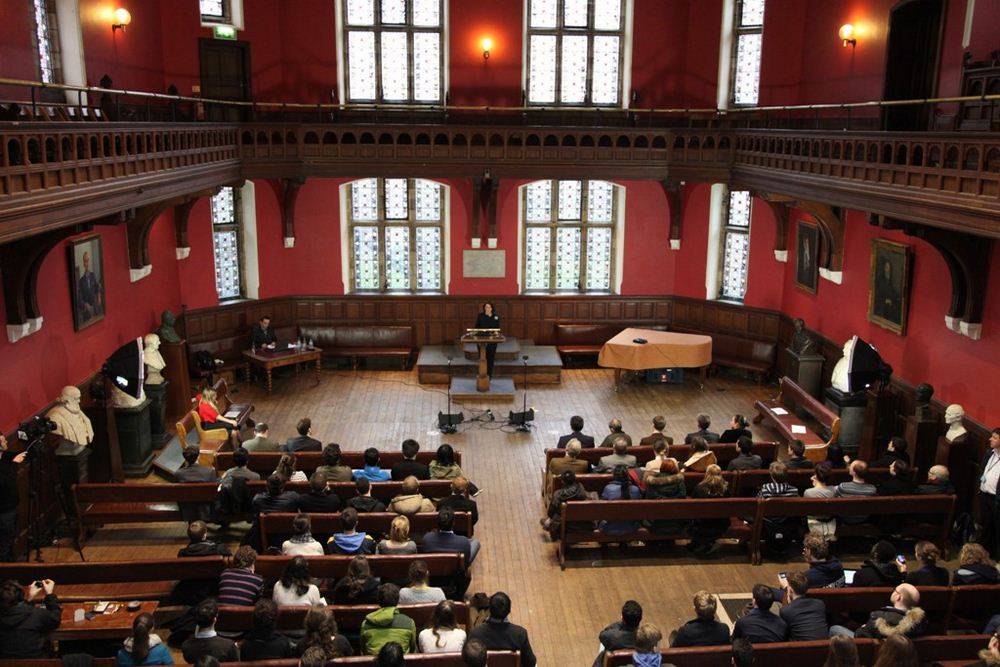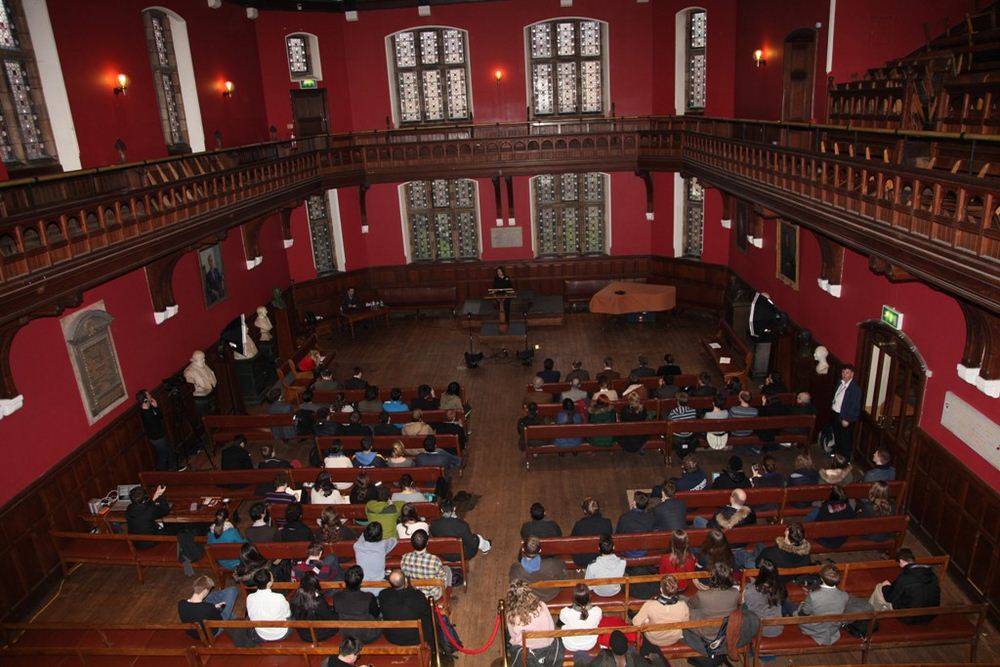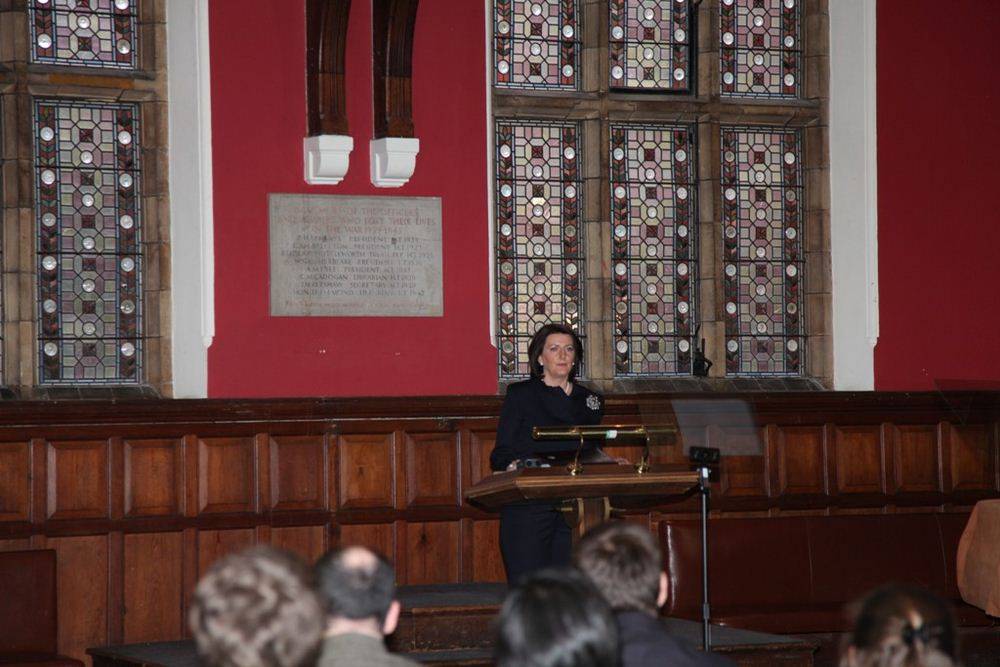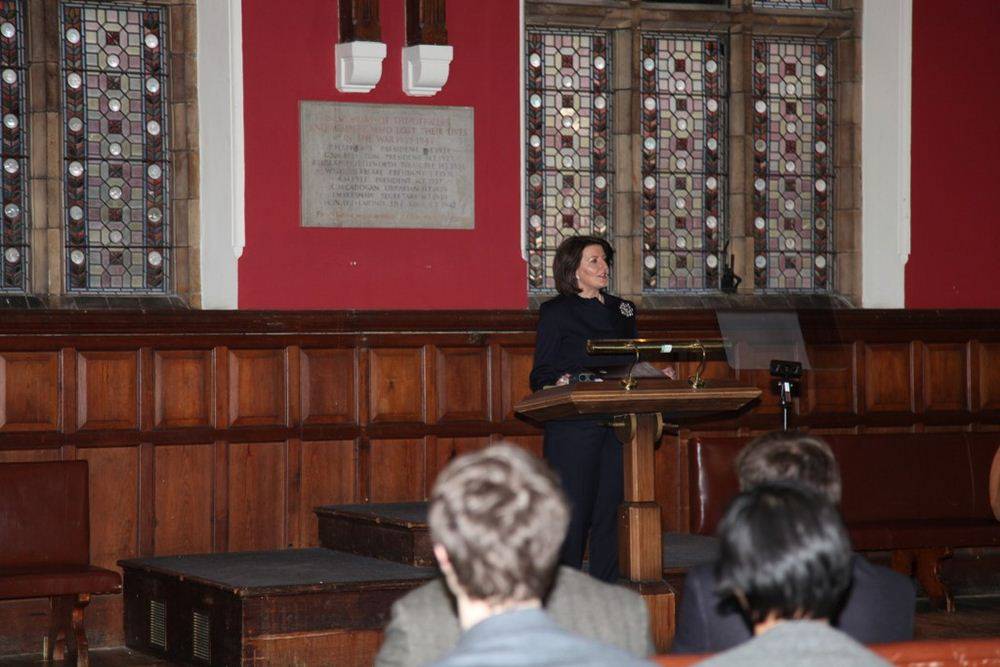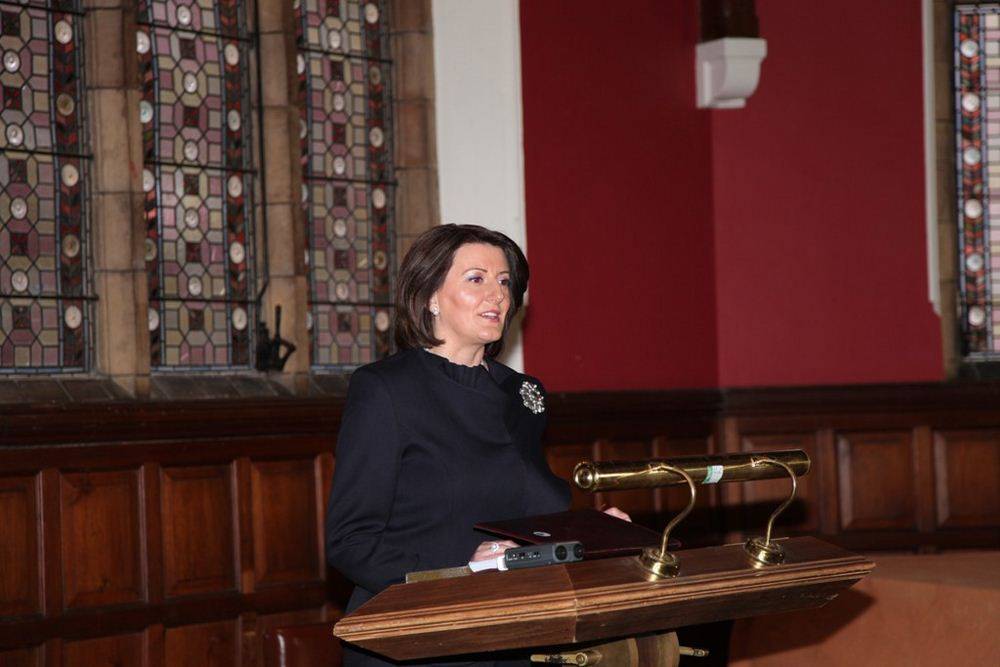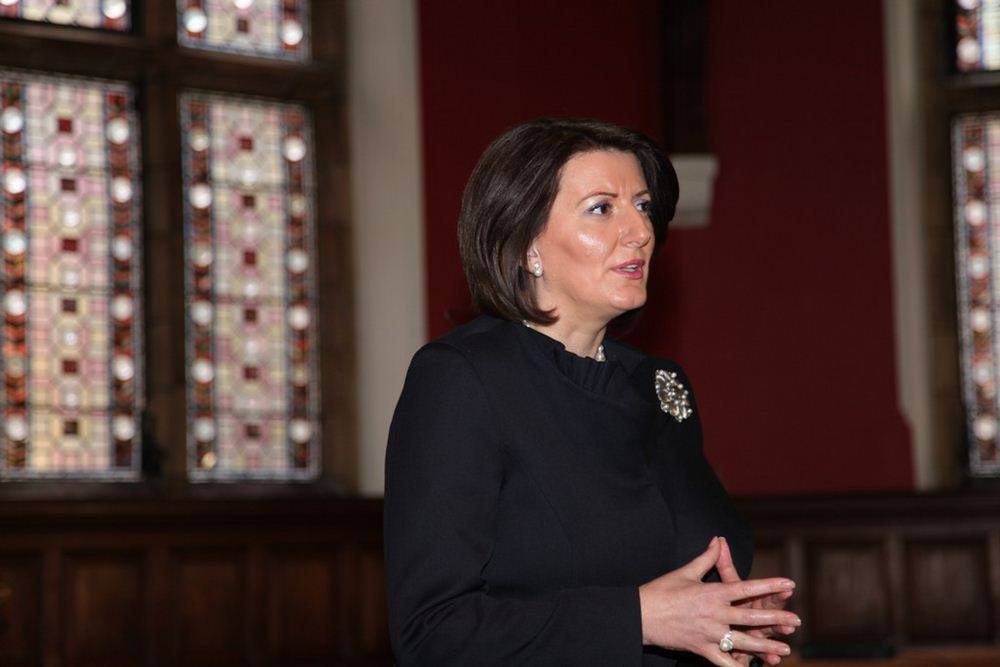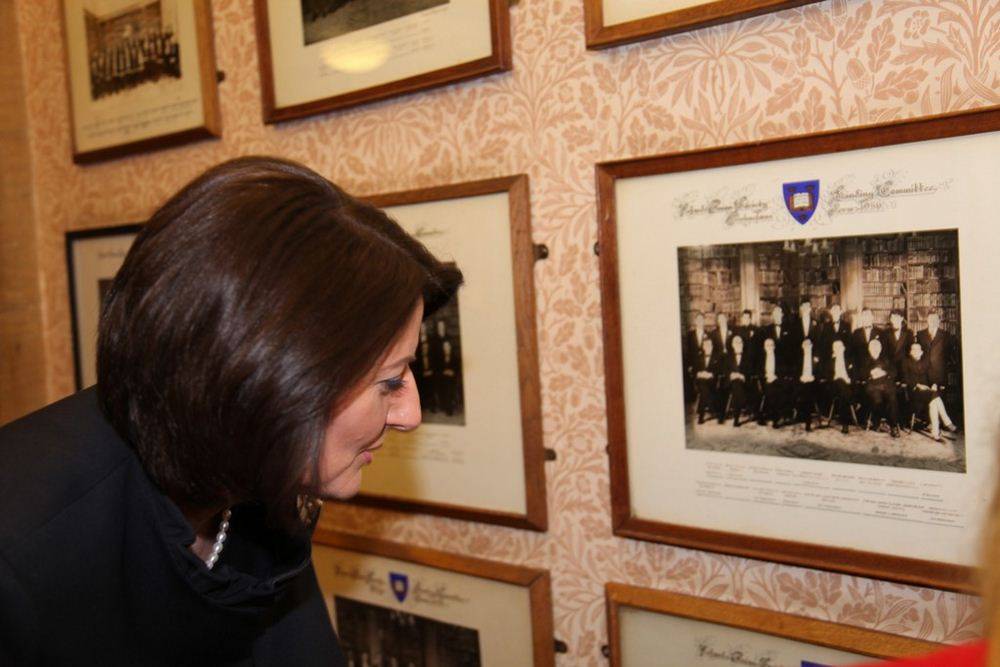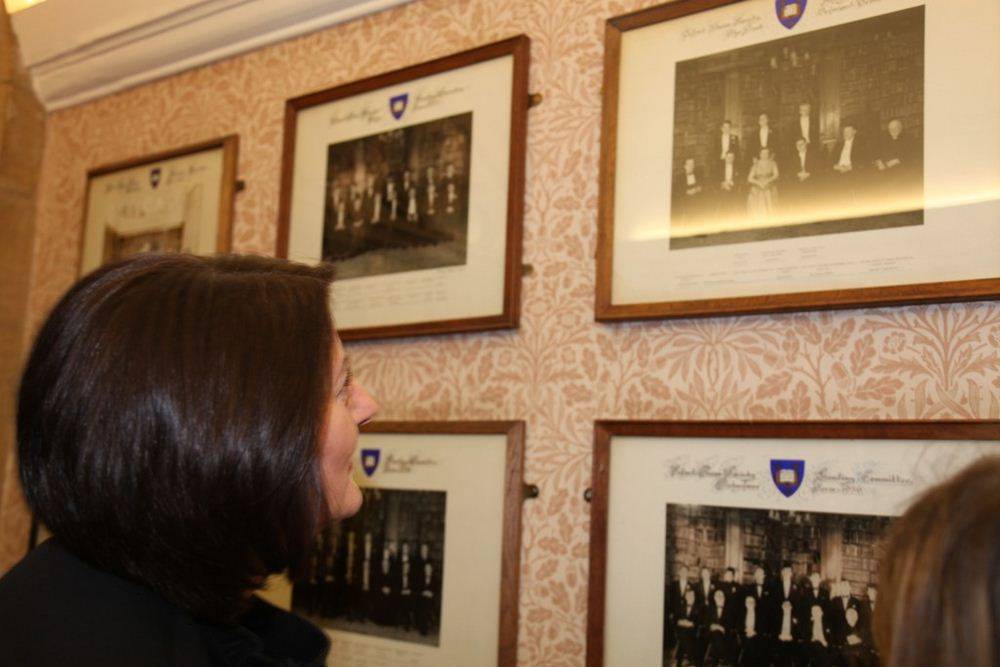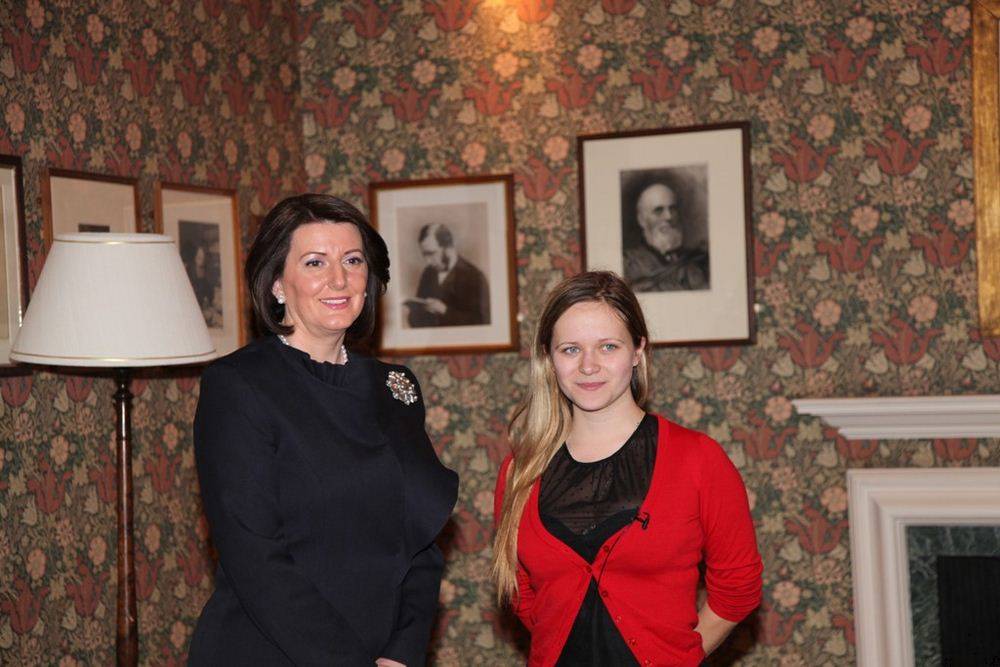Madam President, Members of the Union, thank you for inviting me to share with you a piece of history – the most recent history – of international intervention and state-building in Kosovo, and the path ahead.
Honorable Ladies and Gentlemen,
Madam President, Members of the Union, thank you for inviting me to share with you a piece of history – the most recent history – of international intervention and state-building in Kosovo, and the path ahead.
It is also always a great honor to return to this University, a place of big ideas and important breakthroughs. I am especially privileged to be the first woman President from the Southeastern part of Europe to take this stage and to walk on the footsteps of so many that have shared with you important stories – products of inspiration, human interaction, but also of more tragic and horrific circumstances that have defined the lives of millions of people in this continent and beyond.
I am particularly humbled to join in adding to a storyline that consists of the contribution of one of my personal idols Mother Teresa, the saint of the Albanian descent, a woman of strong ideals and values that took her vows in a church in southern Kosovo who spoke to this Union many years ago. She epitomizes the contribution that the region – unjustly and often unwillingly held back by history from taking its rightful place – has to offer to the rest of the world.
As Churchill once said, and others repeated often, the Balkans produces more history than it can consume, and to those that choose to see it that way the upcoming 100th anniversary of the start of World War One and everything in between will look like a self-fulfilling prophecy.
To others, especially in the academia, the anniversary will serve as a reminder of the fragility of the international society and the large body of history generated over this century will serve as a cautionary tale that may counter the overly optimistic view of an interdependent world that makes large-scale conflict obsolete.
Surely, as we mark the ring of the bullet that was fired in the streets of Sarajevo against Archduke Franz Ferdinand, the heir of the Austro-Hungarian Empire, that started the World War, we are all going to point out to the resemblance of then and now. And yes, some of the developments are hauntingly alike. Yet, the similarities are few. The differences are many.
Today, I will be speaking about these differences while looking at a process that is still very much work in progress, but which I am convinced is our only chance to finally bring peace and lasting stability to the Western Balkans, the very place that took central stage in the events of the past few decades, and to the fulfillment of the promise of a united Europe, whole and at peace.
Throughout this century, the peoples of the Balkans underwent a deep fragmentation, which was most often a consequence of brutality in pursuit of hegemony and domination.
At the turn of the millennia, Kosovo was a battlefield. This time, as the Yugoslav federation crumbled and Serbia launched its nationalist agenda of the creation of Greater Serbia, a campaign of repression was unleashed in Kosovo as a rejection of the will of its Albanian majority to form their independent state, similar to the path that most of the Yugoslav republics took.
Kosovo, and the efforts of the Kosovo Liberation Army, the guerrilla force that sought to wrestle Kosovo out of Serbia’s control and create an independent state, were confronted by indiscriminate violence. The civilians were targeted for ethnic cleansing by the Serbian regime, and NATO – for the first time in its history – intervened to protect civilians making good on the promise of Europe and the democratic world not to let genocide take place ever again.
This humanitarian intervention became the precedent for the development of the norm of responsibility to protect, or intervention in defense of victims of mass killing and gross violation of human rights by their state.
It is this line of thinking that led NATO to intervene again recently in Libya and this is why the experience of Kosovo – while it is not a blueprint or a copy and paste solution for other crisis – carries relevance for the world and future engagements in state-building efforts.
But as Kosovo’s example shows, state-building is hard, and at times frustrating for the international community and mostly for the population that is at the receiving end of competing priorities – the immediate pressure of bread and butter issues or questions of security and building of the state institutions that will take the responsibility to create a democratic society and a market economy where one did not exist before.
In mid-1999, we inherited a country destroyed: Thousands of civilian deaths, and a legacy of ethnic hostilities.
Recovery was not easy. It took a lot of help and a great deal of patience. And a very involved international engagement that allowed Kosovo and its people the time and the means to mature so that when the time was right Kosovo could declare its independence and we could focus on making it a viable country. Democratic. Multiethnic. A home to all its citizens regardless of their ethnic background. At peace with its neighbors and respectful of their sovereignty. A candidate for the European Union and NATO and an aspirant of the values these two bodies place on cooperation and collective security.
In 2008, we declared Kosovo an independent state, crowning this way the efforts of generations of Kosovars to become masters of their own fate. For the last six years we have focused our efforts in making this vision that we have laid out for ourselves come true.
And – despite the ills of transition that we have experienced to which no country is immune and the contradictions that characterized Kosovo’s birth as the Europe’s youngest state – we have made our commitment clear. In these 6 years, we have shown our ability to stay true to the values that lay at the foundation of our state and we have demonstrated our determination to work with our neighbors in overcoming the obstacles of our cooperation. To us, these processes are irreversible. We have fought hard for our rights and our liberty – including the most basic ones such as freedom of speech and the right to life – to ever want to give them up or to erode them for others.
Our determination for the end goal is as strong. While many in this last decade in Europe pondered over the viability of the enlargement policy and its cause and effect on domestic frustration over high unemployment rates, the Western Balkans was united in its aspiration of membership into the EU as the only agenda that brings us together.
It is the EU perspective that has proven to be the tool of unimaginable transformation in a region often resistant to change. And I believe that what we have at hand is a momentum that we need to savor and advance, both in the region and the EU as the only guarantee of the progress that we have made, as the solid proof that we have learned the lessons of the past. And herein, lies that main difference.
Peace in Europe, in large part nourished by the existence of the European Union – has brought not only growth and unprecedented development, but it has brought a period of political stability, freedom of movement and deeper understanding between peoples and nations. The core countries of the EU have seen the historic difference that the union made on the other side of the Iron Curtain, and, us the countries of Western Balkans, understand best the potential this project holds to change around our countries and shift the course of history.
On the premise of future cooperation for a lasting peace and stability we, the countries of the region, have understood that we need to work together. We had a difficult past, a past from which we may not have fully recovered and the consequences of which we continue to suffer, but we are now coming together to the promising vision of a united Europe.
Our road to EU is conditioned by our ability to build good neighborly relations in the Balkans, which means respect for the values harbored by our societies and respect for the integrity of our respective countries.
Good relations are not built solely by signing agreements, but through their implementation and by accepting the independence of our states.
The relations in the Balkans, among countries, continue to remain fragile, difficult and distrustful. We have not managed to build a bridge between us despite some important steps that we have made in the last decade to change the mistaken perception of each other. Yet, what has been unimaginable just a year ago – the dialogue between Kosovo and Serbia – became the biggest success because the idea of European integration – the idea of cooperation and agreement – prevailed.
Both countries, which aspire EU membership, have understood correctly that through dialogue we can resolve all issues, by abandoning the idea of hegemony and by learning to listen, to understand and to find the areas of commonality. We sought a way out of the impasse so that we could unlock our respective paths toward membership into the EU.
We had to find the strength and the courage to address what has been most difficult in the last decade, to open the chapter of political reconciliation with Serbia and to accommodate the Serbian community that lives in the northern part of Kosovo which was held hostage by Serbia’s reluctance to accept the reality of an independent Kosovo.
It is with this conviction that we have approached the dialogue with Serbia.
The dialogue facilitated by EU and supported by the US is the only way to restart our relationship as equals.
The dialogue is meant to ensure stability and reduce tensions in the region through solutions that make use of the best European standards and practices.
We have entered the process of dialogue convinced that only through it we can achieve the needed stability to consolidate our states, to jumpstart our economies and to build neighborly relations which will secure our European future.
In this process we have sought political and social inclusiveness. The dialogue has been a major investment that surpasses ideological boundaries and daily politics. Because – I strongly believe – it determines the path of our country and it touches the lives of every citizen.
Surely, in the effort to build consensus we have witnessed skepticism which must be understood in the context of our past with Serbia and numerous failed agreements that have caused much suffering to the citizens of my country, where the memory of the war and its consequences are still fresh.
As the leader of the highest institution in my country I have supported the dialogue between two independent countries – including my meeting with the President of Serbia in Brussels last year committed to turn the page and help in building a new vision for the future of the whole region.
This past year alone we have concluded agreements on dissolution of the illegal Serb structure that have operated in the north.
We have successfully absorbed members of that community in Kosovo’s police force.
We have held local elections for the first time in the whole territory of Kosovo electing legitimate mayors and councellors that – we trust – represent the will of Kosovo’s citizens.
We have also reached agreements on energy, integrated border management, transport, tax and customs, documents, and we have opened liaising offices in both capitals.
Agreements which ensure stability and certainly agreements which offer more security for the whole region.
These agreements must be fully implemented. And the progress in the process of normalization between Kosovo and Serbia must be assessed chapter by chapter, step by step!
By assessing the implementation of every facet of the agreement and by ensuring the successful completion of each implementation period until we reach its end. Kosovo and Serbia must build a partnership, based on mutual recognition, as the last step toward the integration into the EU.
The agreement between Kosovo and Serbia was made possible because our only alternative was the EU, which made it clear that membership means establishment of good neighborly relations, and that our general progress hinges on overcoming the differences.
It was also possible due to the realization that the progress of our societies cannot remain a hostage of our disagreements and of our inability to grab the opportunity to move forward. The dialogue was seen as the only way to resolve our problems that weigh heavily on the lives of our citizens and that have blocked our path forward.
And this path is the joint path of the countries of the Balkans, intertwined and interdependent and conditioned by our cooperation and our ability to build reciprocity.
There can neither be progress in the Balkans nor membership into the EU of any of the remaining aspirant countries without resolving the problems between us. The EU is not the place where we resolve our problems, but the forum where we contribute to the building of the common European future and where our differences are transformed into advantage and our cooperation into an important value for all the members of this union.
We have invested a lot in the dialogue and we must press forward with the commitment to find acceptable solutions for the citizens of Kosovo, for the normalization of the relations of the two countries.
Because, we have many urgent tasks at hand, a large portion of which involves the strengthening of democratic institutions at home and meeting the needs of our citizens.
The economic development, especially opportunities that create jobs and revive our economies, must take central stage, because this demand is emerging as the common denominator of Albanians and Serbs alike. It is their shared concern.
Yet, we understand that both issues are linked, as is the dialogue between our citizens, whose trust in each other has been shaken since the period of repression and war in Kosovo.
Let me add that amid these competing priorities and as we mold our democracy to make Kosovo a place of great opportunities, we are facing many challenges. We are now focused on the need to build a society based on the rule of law. Our strong commitment against corruption and organized crime must be translated into concrete actions, because we do not want to be qualified as a black mark in the map of Balkans.
We continue to be challenged by corruption and organized crime, despite the founding of institutions and promulgation of tough laws that challenge these phenomena, and despite the joint work we are doing in reducing these tendencies and eradicating them completely later. I admit that we have not done as much as we wanted to accomplish, but we do believe that as a society we possess the capacity and ability to win this battle. I do not want to measure Kosovo against societies that have seen an increase on such activity, because the measuring stick for our country are our own citizens who as we speak remain slightly disillusioned at the pace of the reforms. We are channeling their perception about negative phenomena into a joint fight to defeat them.
Ladies and Gentlemen,
The region’s membership perspective, which unifies all of us, should prevail beyond any doubts about the viability of the open door policy, because this perspective has already yielded tangible results where just about a decade ago they were unthinkable.
Today we have shown creativity and constructiveness to move beyond the animosities of the past and to build trust, reconciliation and to change the image of the whole region, aware that unless we do so, we shall remain in isolation, losing yet another generation to unemployment and social exclusion, and casting a dark shadow over a region that has so much potential to offer.
There is a unique opportunity, and I invite you all to think about the potential this period of time holds for a lasting peace and stability in Europe. For an end to hostilities in the Balkans. For a chance to share in this prosperity, to make it durable for each and every citizen.
But, to make this a success we need more than a perspective as this process is a two-way street and EU must stay the course of its commitment. Its existence must mean more than a fulfillment of standards. It should continue to exist as the idea of our time, as an inspiration to move ahead.
The European Union project will continue to be the only indispensable option that will have the biggest impact and the most positive transformative role in our economies and the development of our societies. Because what we – the countries at the doorstep of the EU see – is an unprecedented prosperity in the past five decades in Europe.
Not only have the founding countries continued their steady development, but the Union has helped close the development gap in Europe by offering the helping hand to countries that have lagged behind due to the events of the past decades.
Kosovo is the best example of acting to create normalcy… Not waiting for normalcy to settle in.
Thank you!

